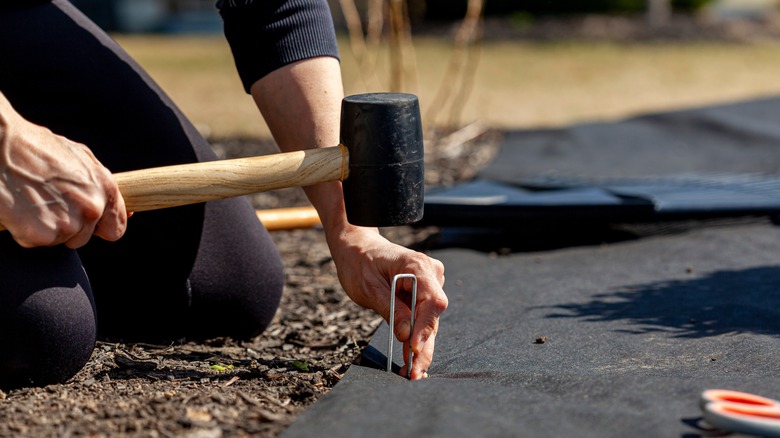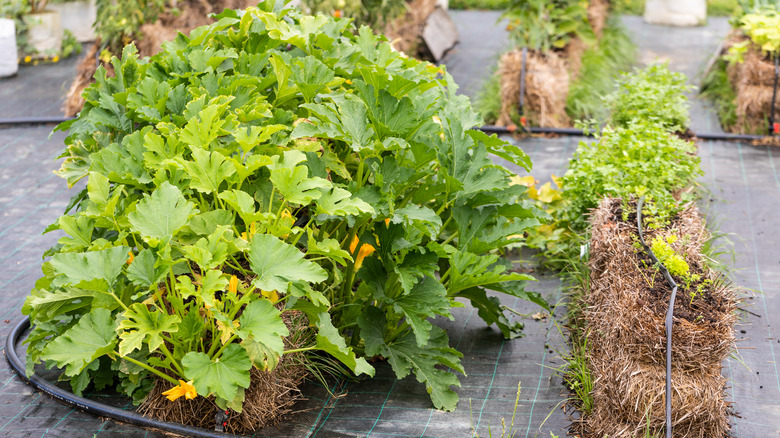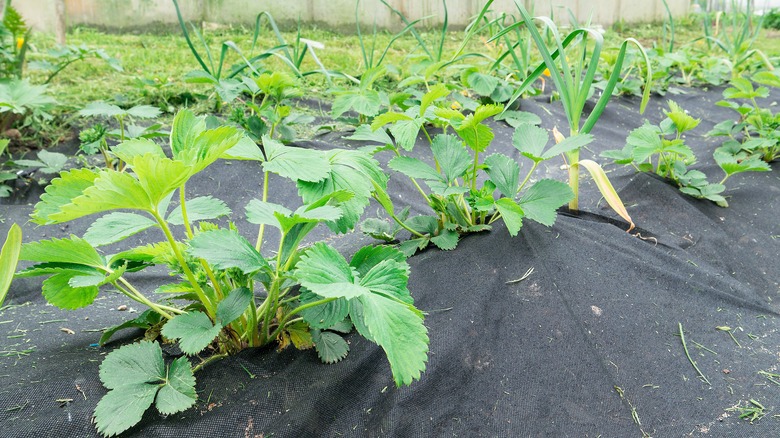Is Landscape Fabric Really Safe To Use In Your Vegetable Garden?
Sometimes it seems like weeds grow much faster than the desirable plants in your vegetable garden. Thankfully, landscape fabric can provide some relief, and as long as you use a product that's safe for use with edible gardens (as most are), you should not have any trouble. Most landscape fabric is suitable because it's formulated with propylene, typically considered a safe chemical (per Thriving Yard) that won't negatively impact your soil.
Like most products you may consider for your garden, there are a few disadvantages to using some forms of landscape fabric, especially those with a heavy plastic base. The key is to know what to look for when choosing this material. Remember that, for many people, this weed barrier can help minimize the need for herbicides or chemical control. As a result, that could mean you are protecting your garden from additional health risks. That's not to mention all the time you save not having to pull weeds each week. However, you have other options, like using locally-sourced organic mulch. This could be a helpful weed deterrent and typically costs less than rolls of landscape fabric for a large garden.
Landscape fabric isn't the eco-friendly solution
For those who want to use landscape fabric in their gardens and ensure they protect the environment in everything they do, tread lightly. Though many forms of this fabric contain recycled plastic (making it more eco-friendly than alternatives), it still has plastic in it, which is ultimately a material that doesn't break down quickly, nor is it natural. If you want alternatives that may be more earth-friendly, consider organic mulch, dye-free cardboard, or skip the covering entirely in favor of a natural pre-emergent herbicide.
Putting that aside, there's nothing in most landscape fabrics to cause illness or impact your garden's health. It also may help support better growth by trapping more moisture and warmth in your soil to promote root development. Many growers find that it does a fantastic job of preventing weeds from seeding too close to your plants, which is an effective way to boost production. On the other hand, not doing anything to prevent weeds will hamper your garden's production and make it hard for you to keep up with sprouting, infiltrating weeds.
Know how to use the right landscape fabric
Not all plastic is the same. For example, taking a roll of garbage bags, you could create the same type of protection for soil as weed seeds cannot get through the plastic to grow. However, this type of plastic will likely have harmful chemicals that can leech into the ground. Many people also worry about the presence of petroleum when purchasing landscape fabric since it's used in the production of many types of plastic. We also know that petroleum-based fabrics contribute to numerous potential environmental risks, including air pollution during their production.
When buying landscape fabric, look for products made without petroleum. You may spend a bit more on these, but you can be confident they are likely to be less harmful to the environment. If you're looking for an all-natural solution, some organic farmers prefer using burlap landscape fabric. While there is not a lot of research on landscape fabric and the release of chemicals in soil, the more natural you can keep your garden, the better. Be sure to keep these products long-term, and, when possible, recycle the material to help ensure it doesn't end up in a landfill.


